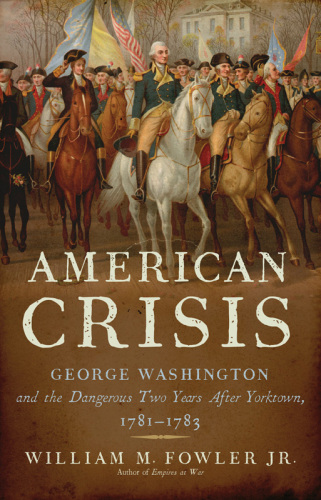
American Crisis
George Washington and the Dangerous Two Years After Yorktown, 1781-1783
کتاب های مرتبط
- اطلاعات
- نقد و بررسی
- دیدگاه کاربران
نقد و بررسی

Starred review from July 18, 2011
Vivid descriptions of personalities from all camps and a spellbinding narrative prove that in the hands of accomplished author and academic Fowler (Empires at War: The French and Indian War and the Struggle for North America), history need not be dull. He thrusts readers into the center of political and military machinations after Cornwallis's 1781 defeat at Yorktown. The British still held some major cities; George III asserted he would abdicate rather than grant American independence; peace and a stable American government were not assured outcomes. But Congress had no funds to pay the army; members favoring a stronger national government encouraged the officer corps, "the only viable national institution," to agitate for their pay. Highlighting George Washington's pivotal role, Fowler relates events leading to Washington's unannounced and unprecedented appearance at a general meeting of officers in 1783, which aborted moves toward mutiny. Those present reaffirmed their allegiance to Congress and country, preserving the army's respect for civilian authority. Even readers familiar with details like the establishment of a republic in Vermont and its flirtations with Canada will find fresh insights in this superb chronicle. 8 pages of b&w photos; 2 maps.

July 15, 2011
Contrary to prevailing belief, winning the Battle of Yorktown was not enough to win the War for Independence. Fowler (History/Northeastern Univ.; Empires at War: The French and Indian War and the Struggle for North America, 1754-1763, 2005, etc.) examines how the young country was held together until the formal cessation of hostilities in 1783.
Debts, revenue raising, military expenditure and pensions, political faction, international intrigue—the author pulls together the threads of this period into a fast-paced presentation of what was necessary to win the peace. Though Cornwallis' troops were imprisoned after his defeat, the Redcoats were not about to leave. Savannah, Charleston, New York City and Penobscot Bay were still under occupation, and George III's troops and mercenaries continued to present a serious threat. Even more so, as Fowler documents, because of the combination of near bankruptcy and factional stalemate which, under the quorum and unanimity rules of the Articles of Confederation, rendered the Continental Congress impotent. The regular army bore the brunt of the political crisis. On one hand, every new indication that peace was at hand made it more difficult to keep the command together against desertion. On the other hand, Congress lacked the revenue to provide the financial resources which would enable Washington and his officers to secure the domestic front. Britain's commander in chief in New York was reporting regularly on the prospects for dissolution of the U.S. Army and the potential to recover his colonial possessions by taking advantage of internal strife. Fowler's narrative builds to a dramatic climax on in March 1783, when Washington and his staff outmaneuvered potential mutiny and revolt and secured unity on the question of pay and pensions. After that, British withdrawal, loyalists and other issues could be dealt with.
Solid history on the war after the war.
(COPYRIGHT (2011) KIRKUS REVIEWS/NIELSEN BUSINESS MEDIA, INC. ALL RIGHTS RESERVED.)

October 15, 2011
Fowler (history, Northeastern Univ.; Empires at War: The French and Indian War and the Struggle for North America, 1754-1763) artfully records the dangerous situation in the United States during the time between Cornwallis's surrender at Yorktown in 1781 and the evacuation of British troops from New York two years later. Drawing from a wealth of letters, he describes General Washington's skill as a leader, his humble and respectful character, and his noble motives in fighting to keep the army organized and disciplined. It was imperative to prevent the British from taking advantage of American disorder and weakness caused by low morale that resulted in desertion, threats of mutiny, and power struggles. Fowler also addresses the ineffectiveness of Congress, paralyzed by insolvency amid a fragile and flawed system of government plagued by squabbles and intrigues. The activities and motives of the British officials in America and abroad complete the vivid picture of the realities that imperiled independence and the preservation of liberty after the war. VERDICT This well-documented and highly readable account will engage and enrich scholars and general readers alike.--Margaret Kappanadze, Elmira Coll. Lib., NY
Copyright 2011 Library Journal, LLC Used with permission.

























دیدگاه کاربران